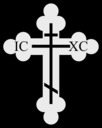Ephraim the Syrian
Saint Ephraim was born in Nisibis of Mesopotamia some time about the year 306, and in his youth was the disciple of Saint James, Bishop of Nisibis, one of the 318 Fathers at the First Ecumenical Council. Ephraim lived in Nisibis, practicing a severe ascetical life and increasing in holiness, until 363, the year in which Julian the Apostate was slain in his war against the Persians, and his successor Jovian surrendered Nisibis to them. Ephraim then made his dwelling in Edessa, where he found many heresies to do battle with. He waged an especial war against Bardaisan; this gnostic had written many hymns propagating his errors, which by their sweet melodies became popular and enticed souls away from the truth. Saint Ephraim, having received from God a singular gift of eloquence, turned Bardaisan's own weapon against him, and wrote a multitude of hymns to be chanted by choirs of women, which set forth the true doctrines, refuted heretical error, and praised the contests of the Martyrs.
Of the multitude of sermons, commentaries, and hymns that Saint Ephraim wrote, many were translated into Greek in his own lifetime. Sozomen says that Ephraim "Surpassed the most approved writers of Greece," observing that the Greek writings, when translated into other tongues, lose most of their original beauty, but Ephraim's works "are no less admired when read in Greek than when read in Syriac" (Eccl. Hist., Book 111, 16). Saint Ephraim was ordained deacon, some say by Saint Basil the Great, whom Sozomen said "was a great admirer of Ephraim, and was astonished at his erudition." Saint Ephraim was the first to make the poetic expression of hymnody and song a vehicle of Orthodox theological teachings, constituting it an integral part of the Church's worship; he may rightly be called the first and greatest hymnographer of the Church, who set the pattern for these who followed him, especially Saint Romanos the Melodist. Because of this he is called the "Harp of the Holy Spirit." Jerome says that his writings were read in some churches after the reading of the Scriptures, and adds that once he read a Greek translation of one of Ephraim's works, "and recognized, even in translation, the incisive power of his lofty genius" (De vir. ill., ch. CXV).
Shortly before the end of his life, a famine broke out in Edessa, and Saint Ephraim left his cell to rebuke the rich for not sharing their goods with the poor. The rich answered that they knew no one to whom they could entrust their goods. Ephraim asked them, "What do you think of me?" When they confessed their reverence for him, he offered to distribute their alms, to which they agreed. He himself cared with his own hands for many of the sick from the famine, and so crowned his life with mercy and love for neighbor. Saint Ephraim reposed in peace, according to some in the year 373, according to others, 379.







